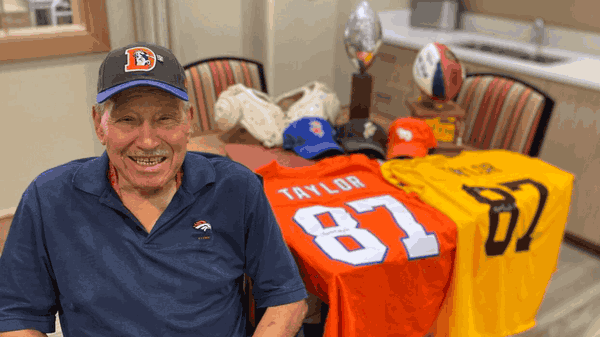
via Imago
Source: X @Denver Broncos 365

via Imago
Source: X @Denver Broncos 365
Born in Kansas City, Mo., Lionel Taylor began as a linebacker for the Chicago Bears in 1959 but soon realized tackling wasn’t his calling. He wasn’t one to resist it, which was precisely the reason why he was cut the following year. In fact, he would rather play as a receiver for semi-pro teams in California than give up. And after every big game, he would sincerely pen down polite notes to then Bears owner George Halas, reminding him he had made a big mistake cutting Taylor.
That was where Dean Griffing, soon to be the Broncos’ first GM, spotted and signed Taylor for the AFL’s inaugural season. That was in 1960, and just like that, there he was… Denver’s first true star in the shape of a “flanker.” In his first AFL season, he stunned the league with 92 catches for 1,235 yards and 12 touchdowns—astronomical numbers for the time. But it wasn’t just the start, from 1960 to 1966, Taylor hauled in 543 receptions for 6,872 yards and 44 touchdowns, leading the AFL in catches five times in six years, earning three All-Star nods, and setting marks that stood for decades. And still, Taylor was thinking beyond the game. He spent the next two seasons with the Houston Oilers and eventually turned to coaching.
Perhaps his greatest contribution were to come after the playing days. Taylor joined the Steelers as a receivers coach during their Super Bowl run in the 1970s. In 1980, he shattered barriers when the Rams promoted him to offensive coordinator, the first Black coordinator in NFL history. His coaching career spanned decades, from Texas Southern to the Browns and NFL Europe. In 2024, he was honored with the Pro Football Hall of Fame’s Award of Excellence. Fellow HoD coach Tony Dungy said, “I came in the league with Herm Edwards and Ray Rhodes, and we all became head coaches. It would not have happened without Lionel Taylor.” And now, Denver mourns the loss of a pioneering Ring of Fame member, while Kansas City mourns the loss of a true local hero.
ADVERTISEMENT
Article continues below this ad
View this post on Instagram
ADVERTISEMENT
Article continues below this ad
Lionel Taylor passed away at his Kansas City home on August 6, 2025, following a long illness, his family announced; the news, which comes after his 2024 hospitalization for a severe infection, was later shared by the Broncos in a tribute post: “We are saddened to learn of the passing of #BroncosROF wide receiver Lionel Taylor,” the Broncos wrote on their social media handle. “An original Bronco and one of the most dominant players of his era, Taylor had a tremendous impact on the franchise during his seven seasons in Denver (1960-66). Our hearts go out to Taylor’s family and friends. 🧡💙.“
Following the post, fans across the NFL world flooded social media with heartfelt tributes, reflecting the deep impact Taylor had on and off the field.
ADVERTISEMENT
Article continues below this ad
Tributes pour in after the tragic passing of Lionel Taylor
One fan said, “Always a Legend rip Taylor 😞,” capturing the simple but heartfelt admiration many felt. Another noted, “The original legend 🙏🏻🙏🏻🙏🏻🙏🏻,” while one added, “His legacy was built from the beginning…. He lived to see the modern era win a trophy on the 50th anniversary of Football 🏈…. Rest Well Sir LT 🕊️,” highlighting both his historic contributions and the joy he experienced witnessing the game evolve. Others remembered Taylor for his warmth and generosity.
One fan shared, “Nicest person I’ve met, I asked him to sign my phone. Still have it to this day 🙏🏼 RIP brotha!” Another offered a prayerful tribute: “Eternal rest grant unto him, oh Lord. Let Your perpetual light shine upon him, and may he rest in peace!🙏🏼✝” And one expressed pure devotion, writing, “CONDOLENCES TO A OG BRONCO LEGEND, REST IN GOD’S PARADISE!!!❤️❤️❤️.” Together, these reflections paint Lionel Taylor’s legacy as a mix of record-breaking skill and the simple human touch that made him unforgettable. Rest In Power, Legend.
What’s your perspective on:
Did Lionel Taylor's legacy as a pioneer coach and player shape the modern NFL we see today?
Have an interesting take?
ADVERTISEMENT
ADVERTISEMENT
ADVERTISEMENT
ADVERTISEMENT



Did Lionel Taylor's legacy as a pioneer coach and player shape the modern NFL we see today?